Recent Blog Posts
What Is the Difference Between IR and F Family Visas?
 Someone who wants to become a lawful permanent resident (LPR) of the United States — also referred to as getting a green card — has several options. One of the best ways is by showing you have a family member who is a U.S. citizen or LPR. If that family member is willing to sponsor you, you may be eligible for a visa that can help you get a green card. But which family members are acceptable to immigration authorities?
Someone who wants to become a lawful permanent resident (LPR) of the United States — also referred to as getting a green card — has several options. One of the best ways is by showing you have a family member who is a U.S. citizen or LPR. If that family member is willing to sponsor you, you may be eligible for a visa that can help you get a green card. But which family members are acceptable to immigration authorities?
There are two types of family-based immigrant visas: an immediate relative (IR) visa and a family preference (F) visa. This article will discuss each visa and explore the differences between them. For more details or legal assistance in any immigration-related matter, contact an experienced Texas immigration attorney.
What Is an IR Visa?
An immediate relative (IR) visa is for applicants who have close family members with U.S. citizenship. This is generally the fastest way to become an LPR because the wait time for the visa is shorter. Family members who qualify as immediate relatives are:
5 Common Mistakes in Green Card Applications
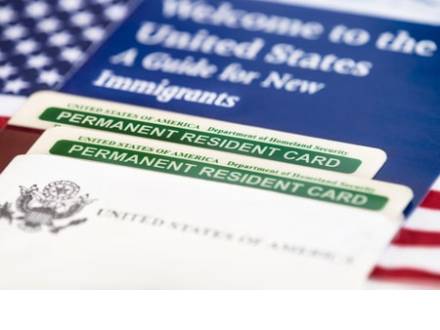 Applying to become a lawful permanent resident (LPR) in the United States, also referred to as obtaining a green card, is not an easy task. The process is complex and requires extremely careful attention to detail. Leaving out any of those details or submitting them incorrectly can result in a denial of your application. If your application is rejected, you may have to start the process over again, which includes paying additional fees. Avoid making these five common mistakes in your application and contact a Texas immigration attorney to help maximize the chances of your green card application being accepted.
Applying to become a lawful permanent resident (LPR) in the United States, also referred to as obtaining a green card, is not an easy task. The process is complex and requires extremely careful attention to detail. Leaving out any of those details or submitting them incorrectly can result in a denial of your application. If your application is rejected, you may have to start the process over again, which includes paying additional fees. Avoid making these five common mistakes in your application and contact a Texas immigration attorney to help maximize the chances of your green card application being accepted.
Providing Incomplete or Inaccurate Information
Some applicants, particularly those for whom English is a second language, struggle with providing complete and accurate information. This may be because:
- They do not understand the application instructions.
- They have difficulty writing in English.
What Can I Do if I Am Denied a Fiancé Visa?
 A foreign national who intends to marry a U.S. citizen may be eligible to apply for a K-1 fiancé visa. This visa allows foreign citizens to enter the United States and marry the U.S. citizen sponsor within 90 days. If the marriage occurs, the foreign citizen can apply for lawful permanent resident (LPR) status, otherwise known as a green card.
A foreign national who intends to marry a U.S. citizen may be eligible to apply for a K-1 fiancé visa. This visa allows foreign citizens to enter the United States and marry the U.S. citizen sponsor within 90 days. If the marriage occurs, the foreign citizen can apply for lawful permanent resident (LPR) status, otherwise known as a green card.
Fiancé visas are a great way to start the immigration process and become a resident of the United States. However, the application process for a K-1 visa follows strict procedures aimed at weeding out fraud. Sometimes, the U.S. government denies fiancé visas to applicants who are in perfectly legitimate relationships with American citizens because there appear to be red flags, incomplete documentation, or other reasons. This article will discuss those reasons and what you can do if you are denied a K-1 fiancé visa. If your visa application is rejected, contact a Texas immigration attorney who can walk you through your options.
Proving Extreme Hardship for a Waiver of Inadmissibility
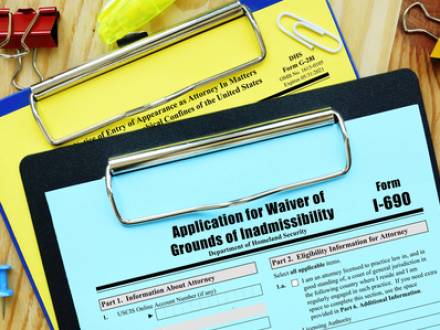 Non-U.S. citizens who want to live in the United States must follow certain legal steps. Completing these steps, however, does not guarantee a visa. Applicants who fall into certain categories may be denied on grounds of inadmissibility.
Non-U.S. citizens who want to live in the United States must follow certain legal steps. Completing these steps, however, does not guarantee a visa. Applicants who fall into certain categories may be denied on grounds of inadmissibility.
To find out if you or a loved one might be considered inadmissible, speak with a Texas immigration attorney. An experienced lawyer can review your specific circumstances, advise you on how immigration authorities might view your application, and advise you on whether you qualify to apply for a waiver of inadmissibility.
This article will discuss inadmissibility, waivers of admissibility, and how to prove extreme hardship to obtain such a waiver.
What Is Inadmissibility?
The U.S. Immigration and Nationality Act sets out certain criteria that may make a visa applicant inadmissible, meaning he or she is not accepted in the U.S. Immigration authorities may consider a noncitizen inadmissible if he or she:
How Can I Remove Conditions From My Green Card?
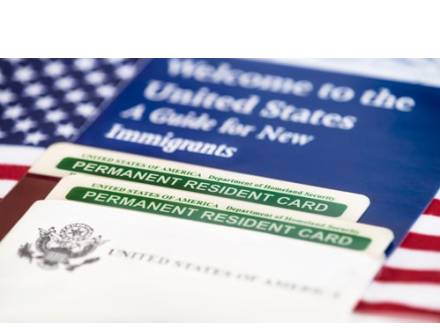 A green card grants the cardholder permanent residency in the United States, which means that he or she may live and work in the U.S. However, this permanence may only be temporary. If a noncitizen obtained a green card through marriage to a US citizen and the marriage was less than two years old when it was issued, the green card will likely be conditional.
A green card grants the cardholder permanent residency in the United States, which means that he or she may live and work in the U.S. However, this permanence may only be temporary. If a noncitizen obtained a green card through marriage to a US citizen and the marriage was less than two years old when it was issued, the green card will likely be conditional.
This article will discuss what conditional residence is and how to remove the conditions. Keep in mind that consulting a Texas immigration attorney is the best way to remove the conditions from a green card.
What Is Conditional Residence?
The United States government allows immigrants who are married to U.S. citizens to apply for permanent residence. However, this rule has sometimes been abused, and noncitizens have entered into marriages solely to obtain green cards. To prevent marriage fraud, the U.S. Citizenship and Immigration Services (USCIS) grants conditional residence to immigrants who are married to U.S. citizens for less than two years. This conditional green card, referred to as a CR1 visa, is only valid for two years and must be renewed within 90 days of the expiration date.
Can the Public Charge Rule Affect Family-Based Immigration?
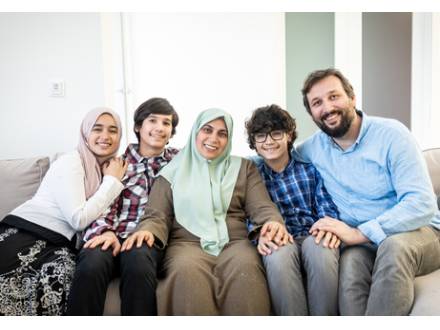 The US immigration process can be difficult and rife with challenges. One of those challenges is the public charge rule, which makes some immigration candidates ineligible for permanent residency in the United States. The public charge rule has gone through a few changes in recent years, which is why it is important for applicants to understand how it works when applying for a green card or visa.
The US immigration process can be difficult and rife with challenges. One of those challenges is the public charge rule, which makes some immigration candidates ineligible for permanent residency in the United States. The public charge rule has gone through a few changes in recent years, which is why it is important for applicants to understand how it works when applying for a green card or visa.
A common question is whether the public charge rule affects someone who is applying for family-based immigration, meaning that a family member in the US is sponsoring a visa or green card. Some applicants may assume that family sponsorship overcomes the public charge rule and other factors. This article will explore that issue, but remember that your best legal resource is a Texas immigration attorney.
What Is the Public Charge Rule?
The United States government wants to know that those who wish to take up permanent residence in the country are not going to be a strain on the government. Therefore, the public charge rule says that someone who is likely to depend on public benefits is inadmissible. US Citizenship and Immigration Services (USCIS) officials will make this determination by looking to see if the applicant has received cash assistance from the government through the following programs:
Challenges for Texas Deportation Law as Other States Follow
 Texas has recently enacted a controversial immigration law, S.B. 4, which allows state police to arrest and deport individuals suspected of unlawfully crossing the Mexican border. This legislation, signed by Governor Greg Abbott in December, has faced significant opposition from civil rights groups and is currently awaiting constitutional review. Despite the legal challenges, other states such as Oklahoma, Iowa, and Arizona have proposed similar rules, sparking a national debate on state-level immigration enforcement. This situation and the rules applied can get confusing, but a Texas lawyer can help you understand the facts.
Texas has recently enacted a controversial immigration law, S.B. 4, which allows state police to arrest and deport individuals suspected of unlawfully crossing the Mexican border. This legislation, signed by Governor Greg Abbott in December, has faced significant opposition from civil rights groups and is currently awaiting constitutional review. Despite the legal challenges, other states such as Oklahoma, Iowa, and Arizona have proposed similar rules, sparking a national debate on state-level immigration enforcement. This situation and the rules applied can get confusing, but a Texas lawyer can help you understand the facts.
The Controversial Texas Law and Its Implications
S.B. 4 represents a significant shift in immigration enforcement at the state level. The law empowers Texas state police to take a more active role in immigration matters, traditionally the domain of federal authorities. Civil rights advocates argue that this legislation is unconstitutional and contradicts federal immigration policy. The law’s opponents have filed lawsuits to prevent its implementation, originally scheduled for March. The Texas law has significant implications:
Do You Need a Lawyer to Get a Green Card?
 Obtaining a green card is a significant milestone for many immigrants in the United States. While it is possible to go through the process independently, working with a Texas lawyer can significantly improve your chances of success and reduce stress.
Obtaining a green card is a significant milestone for many immigrants in the United States. While it is possible to go through the process independently, working with a Texas lawyer can significantly improve your chances of success and reduce stress.
How a Lawyer Can Help You Get a Green Card
Immigration lawyers play a major role in guiding clients through the challenging and ever-changing legalities of immigration laws. An attorney stays current with the latest regulations, providing guidance tailored to your situation. With legal representation on your side, you can ensure all necessary forms are completed accurately and submitted with the required supporting documentation, preventing delays or denials due to paperwork errors.
Depending on your circumstances, multiple pathways may exist to obtain a green card. An attorney can assess your situation and recommend the most suitable approach for your case. If your case requires an interview or hearing, your lawyer can prepare you for what to expect and provide representation during these crucial moments. Should any issues arise during the application process, an attorney can help address them promptly and effectively, potentially saving you time and stress.
How Do You Apply for Citizenship Through Naturalization?
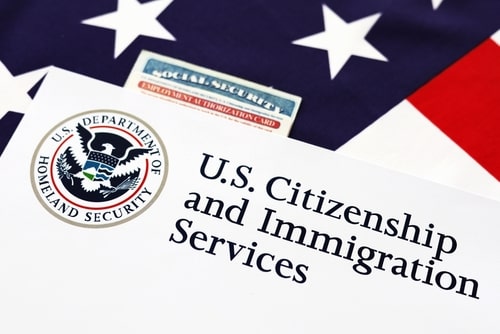 Becoming a United States citizen through naturalization is a significant milestone for many immigrants. This process allows eligible individuals to fully participate in American civic life, including the right to vote and hold public office. In Texas, as in other states, the naturalization process follows federal guidelines with some specific considerations. A Texas lawyer can walk you through the key steps and requirements for applying for citizenship through naturalization.
Becoming a United States citizen through naturalization is a significant milestone for many immigrants. This process allows eligible individuals to fully participate in American civic life, including the right to vote and hold public office. In Texas, as in other states, the naturalization process follows federal guidelines with some specific considerations. A Texas lawyer can walk you through the key steps and requirements for applying for citizenship through naturalization.
The First Step Towards Becoming a Citizen Through Naturalization
The journey to citizenship begins with determining your eligibility. To apply for naturalization, you must meet several requirements:
- Be at least 18 years old
- You need to have had a green card for at least five years (or three years if married to a U.S. citizen).
Common Reasons for Inadmissibility and How to Overcome Them
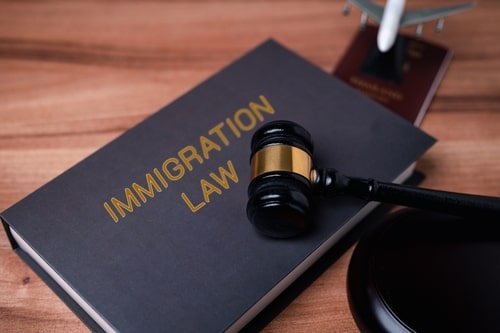 The challenging world of immigration law can be daunting, especially when understanding the grounds for inadmissibility and how to overcome them. A Texas lawyer can help you understand the common grounds for inadmissibility and the strategies available to help potentially achieve your immigration goals.
The challenging world of immigration law can be daunting, especially when understanding the grounds for inadmissibility and how to overcome them. A Texas lawyer can help you understand the common grounds for inadmissibility and the strategies available to help potentially achieve your immigration goals.
Criminal Convictions Can Be a Hurdle to Overcome
One of the most common reasons for inadmissibility is having a criminal record. Even minor offenses can create significant barriers to immigration. However, there are strategies to tackle this concern. Depending on the nature and severity of the crime, you may be able to seek a waiver of inadmissibility. This process involves illustrating that the beneficial factors in your case outweigh the negative ones. Working closely with an attorney who can guide you through the waiver application process and present a compelling case on your behalf is beneficial.






